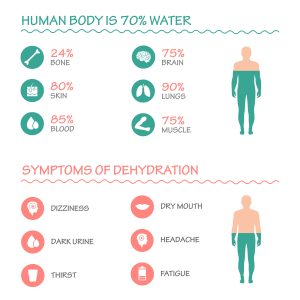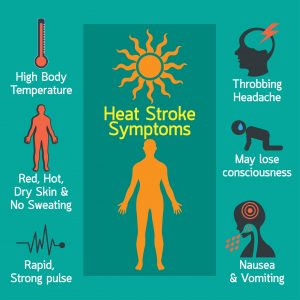

Exertional Dehydration — usually dehydration occurs with vigorous exercise in hot and humid environments. Dehydration occurs when you lose fluids more than you take in. If loss fluids aren’t replaced dehydration will occur.
Treatment: Have patient orally re-hydrate with carbohydrate-electrolyte (CE) drinks. Ingestion of fluids: 5-8% will facilitate hydration. Other drinks: coconut water and 2% milk. Alternatively, if drinks aren’t available then potable water may be used.
Severe Dehydration Treatment: If the patient is severely dehydrated or is in a life-threatening situation activate the EMS. EMS will be able to provide Intravenous hydration that consists of essential nutrients.
Heat Exhaustion is a heat-related illness that can occur through exposure to high temperatures, especially when combined with strenuous physical activity and high humidity. However, it’s not as severe as a heatstroke or heat cramp. Symptoms include heavy sweating, faintness, muscle cramps, dizziness, nausea, headache, weakness, and rapid pulse.
Treatment: First, move the person out of the heat and into an air-conditioned or shady area, then lay them down. Ensure their legs and feet are elevated slightly. Second, remove any heavy or tight clothing and give the person cool water or any nonalcoholic drink.
Lastly, cool them by fanning or spraying cool water.
A heatstroke is a form of heat injury caused by prolonged exposure to high temperatures or physical exertion. It usually occurs during summer. Symptoms include High body temperature – usually 104 F or higher, nausea and vomiting, headache, confusion, slurred speech, agitation, or irritability, rapid and shallow breathing, flushed skin, and racing heart rate.
Treatment: If you suspect heatstroke, first move the individual out of the heat and remove any heavy or excess clothing. Second, cool them by spraying cold water, placing them in a cool tub of water, or fanning.
Then, give the person a cool drink to rehydrate. Ensure it’s not alcoholic or caffeinated and avoid cold drinks to prevent stomach cramps. Lastly, perform CPR if they show no signs of breathing.
0 Comments